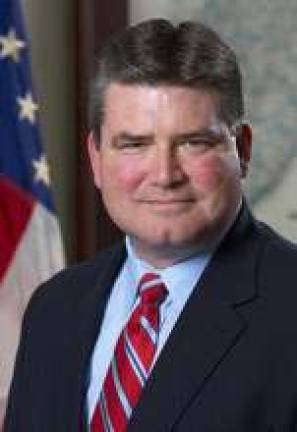Oroho measures advance in state legislature

TRENTON — Three bills sponsored by state Sen. Steve Oroho (R-Sussex) were recently passed by the state Senate. One bill would allow third-party vendors to administer commercial driver license tests. Another bill would combat price-gouging after a natural disaster. The third bill would expand anti-discrimination protections to military members and veterans.
“Drivers with commercial licenses are in huge demand, but New Jersey can’t keep up with new federal guidelines because our reliance on state-administered tests has created a massive backlog of people waiting to get their licenses,” Oroho said regarding S-2364, which establishes a Commercial Driver License Testing Pilot Program and would allow three private, third-party vendors to administer the knowledge and skills tests for commercial licenses. One vendor would be located in the each of the southern, central and northern parts of the state.
“This is a common sense solution to speed up the process and get these drivers to work,” Oroho said.
Drivers in New Jersey have some of the longest waits to get their CDL, with some people waiting three months or longer. In the 39 other states that already allow private third-party testing, the wait time is as short as one week.
Current New Jersey law already allows for third-party testing, but no such program exists because the state never implemented any regulations. This legislation will institute a pilot program until regulations can be formally adopted. Nine months after the pilot begins, the chief administrator of the Motor Vehicle Commission would be required to submit an evaluation to the governor with recommendations that will facilitate the permanent use of third-party vendors.
Regarding S-2321, which amends existing law to provide that it would be unlawful for any person to sell any product at an excessive price for a 30-day period following the declaration of a state of emergency, Oroho said, “The protections we put in place will deter businesses from taking advantage of consumers during a natural disaster by spiking prices for necessities, such as gasoline and groceries.”
The bill would also allow for the governor to extend the period during which the price gouging prohibition remains in force.
“Many reputable small businesses have been negatively impacted because of the inflexibility of the 30-day time period,” Oroho said. “This bill will ensure business have the ability to be competitive following the end of an emergency declaration, while still protecting consumers from price gouging tactics that threaten their welfare and safety.”
Under current law, excessive price increases are prohibited for a period that extends to 30 days after the termination of a state of emergency. An “excessive price” is defined as more than 10 percent above the price of the item or service as offered immediately before the state of emergency.
“This measure allows for greater flexibility because it lets the Governor tailor the price control period to specifically fit each emergency,” Senator Oroho said. “I think this will help us strike a balance between protecting consumers during a natural disaster and supporting businesses once the emergency is over.”
The third Oroho-sponsored bill passed by the Senate would ensure that members of the United States Armed Forces are protected against discrimination.
“It takes a special kind of person to sign up for military service,” Oroho said. “They put their lives on hold while they go out to serve our country. They deserve to have every chance to succeed once they return to civilian life.”
The bipartisan bill, S-726, also sponsored by Senator Nilsa Cruz-Perez (D-Camden) would extend full protection under the Law Against Discrimination (LAD) to people who have liability for service in the Armed Forces. Under current law, they are listed as a protected class in some cases but not others.
The legislation makes it clear that they are entitled to the same protection under the LAD as other protected classes, including protection against discrimination in employment, public accommodations, housing, land use, lending and association membership.
The bill expands an existing law that requires contractors on state construction projects to guarantee equal employment to Vietnam Veterans to include all veterans.
“The men and women of our armed forces take an oath to protect our country,” Senator Oroho said. “We need to do all we can to protect and provide for them.”
To become law, an identical bill to the one passed by the Senate must be passed by the state Assembly and afterwards signed by the governor.